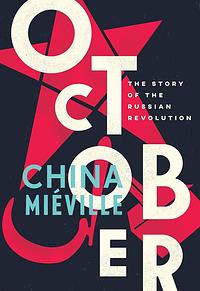Take a photo of a barcode or cover
Δεν είχα ιδέα για το πως εξελίχθηκε η ρώσικη επανάσταση και φτάσαμε σε αυτό που κατάντησε. Αν κρίνω απο την πόση θερμή και εθελοτυφλία υπερασπίζεται το θέμα η πλειοψηφία των σημερινών κουμουνιστών (μίνιμουμ το 5% στις ελληνικές εκλογές!), ίσως ούτε αυτοί δεν έχουν ιδέα. Ήμουν τόσο έκπληκτος με αυτά που διάβασα, που έψαξα να επιβεβαιώσω οτι ισχύουν και οτι δεν είναι απλώς μια ερμηνεία του συγγραφέα.
Η ρώσικη επανάσταση έγινε τον Φεβρουάριο. Απο τον Φεβρουάριο ως τον Οκτώβριο η Ρωσία μπορεί να ήταν και η πιο φιλελεύθερη χωρά στον κόσμο. Συστήσαν ένα κοινοβούλιο οπού όλοι είχαν δικαίωμα ψήφου ανεξάρτητος φύλου, φυλής, θρησκείας κλπ. Μέχρι και επιτροπή μουσουλμάνων γυναικών υπήρχε, η οποία θέσπισε την προορατικότητα της μαντίλας και την πολυγαμία μονό με την άδεια της πρώτης γυναικάς. Γενικά, όλα φαίνονταν να είναι πολύ καινοτόμα για την εποχη. Η εξουσία διαμοιραζόταν μεταξύ της Δουμας και των Σοβιέτ, ενός κάτι σαν συνδικάτου της κάθε επαγγελματικής και τοπικής ομάδας.
Η κατάσταση, όμως, φαινόταν αδιέξοδη από την αρχή. Η Ρωσία ηταν μια πολυεθνική, ανομοιογενής χωρά, χωρίς ανεπτυγμένη βιομηχανία και πολύ άπειρη στα δημοκρατικά ήθη. Ταυτόχρονα συντηρούσαν έναν εξαντλητικό πόλεμο με την Γερμανία. Καθημερινά υπήρχαν απεργίες και βίαιες εξεγέρσεις. Οι μπολσεβίκοι ήταν το πιο ακροαριστερό κόμμα στην Δουμα που ήθελε απαιτούσε απεμπλοκή από τον πόλεμο και να περάσει η εξουσία στα Σοβιέτ. Τον Οκτώβριο πήραν τα ηνία της χώρας με πραξικόπημα, κατέλυσαν την δουμα και απεμπλακησαν από τον πρώτο παγκόσμιο πόλεμο με μια πολύ επιζήμια συμφωνία. Άλλα ακόμη και να μην γινόταν η μπολσεβικική εξέγερση τον Οκτώβριο, θα είχαμε αναμφίβολα κάποιο άλλο φασιστικό ή κομουνιστικό πραξικόπημα, όπως αυτό που έγινε ανεπιτυχώς με τον στρατηγό Κορνιλοφ το καλοκαίρι του ίδιου έτους.
Το βιβλίο αν και στέκετε στα ιστορικά γεγονότα, προσθέτοντας την λογοτεχνική πινελιά του συγγραφέα, κάνοντας το βιβλίο να διαβάζεται πιο άνετα. Το τίμημα για αυτήν την άνεση είναι ότι κάποιος που επιθυμεί να μάθει πραγματικά τι συνέβη, να δυσκολεύεται να παρακολουθήσει τις τόσες μεταφορές του σκηνικού. Το βιβλίο μας μεταφέρει, μέσα στο ίδιο κεφάλαιο, την μια στο παλάτι Τσάρου, την άλλη σε μια απεργία, την τρίτη στον Λένιν που είναι εξόριστος, αμέσως μετά σε κάποιο μέτωπο του πολέμου. Εντελώς χαοτική δομη. Επίσης, έχει έναν ενοχλητικό τρόπο να αρχίζει πολλές προτάσεις, με ένα "μολοντούτο" που μου έσπασε λίγο τα νεύρα.
Μολοντούτο, λοιπόν, ήταν μια αξιόλογη προσπάθεια να μεταφερθεί η Ρώσικη επανάσταση με έναν τρόπο που κατανοητό στον αναγνώστη και να παραθέτει καθημερινές στιγμές από την ζωή των πρωταγωνιστών άλλα και του απλού λαού.
Η ρώσικη επανάσταση έγινε τον Φεβρουάριο. Απο τον Φεβρουάριο ως τον Οκτώβριο η Ρωσία μπορεί να ήταν και η πιο φιλελεύθερη χωρά στον κόσμο. Συστήσαν ένα κοινοβούλιο οπού όλοι είχαν δικαίωμα ψήφου ανεξάρτητος φύλου, φυλής, θρησκείας κλπ. Μέχρι και επιτροπή μουσουλμάνων γυναικών υπήρχε, η οποία θέσπισε την προορατικότητα της μαντίλας και την πολυγαμία μονό με την άδεια της πρώτης γυναικάς. Γενικά, όλα φαίνονταν να είναι πολύ καινοτόμα για την εποχη. Η εξουσία διαμοιραζόταν μεταξύ της Δουμας και των Σοβιέτ, ενός κάτι σαν συνδικάτου της κάθε επαγγελματικής και τοπικής ομάδας.
Η κατάσταση, όμως, φαινόταν αδιέξοδη από την αρχή. Η Ρωσία ηταν μια πολυεθνική, ανομοιογενής χωρά, χωρίς ανεπτυγμένη βιομηχανία και πολύ άπειρη στα δημοκρατικά ήθη. Ταυτόχρονα συντηρούσαν έναν εξαντλητικό πόλεμο με την Γερμανία. Καθημερινά υπήρχαν απεργίες και βίαιες εξεγέρσεις. Οι μπολσεβίκοι ήταν το πιο ακροαριστερό κόμμα στην Δουμα που ήθελε απαιτούσε απεμπλοκή από τον πόλεμο και να περάσει η εξουσία στα Σοβιέτ. Τον Οκτώβριο πήραν τα ηνία της χώρας με πραξικόπημα, κατέλυσαν την δουμα και απεμπλακησαν από τον πρώτο παγκόσμιο πόλεμο με μια πολύ επιζήμια συμφωνία. Άλλα ακόμη και να μην γινόταν η μπολσεβικική εξέγερση τον Οκτώβριο, θα είχαμε αναμφίβολα κάποιο άλλο φασιστικό ή κομουνιστικό πραξικόπημα, όπως αυτό που έγινε ανεπιτυχώς με τον στρατηγό Κορνιλοφ το καλοκαίρι του ίδιου έτους.
Το βιβλίο αν και στέκετε στα ιστορικά γεγονότα, προσθέτοντας την λογοτεχνική πινελιά του συγγραφέα, κάνοντας το βιβλίο να διαβάζεται πιο άνετα. Το τίμημα για αυτήν την άνεση είναι ότι κάποιος που επιθυμεί να μάθει πραγματικά τι συνέβη, να δυσκολεύεται να παρακολουθήσει τις τόσες μεταφορές του σκηνικού. Το βιβλίο μας μεταφέρει, μέσα στο ίδιο κεφάλαιο, την μια στο παλάτι Τσάρου, την άλλη σε μια απεργία, την τρίτη στον Λένιν που είναι εξόριστος, αμέσως μετά σε κάποιο μέτωπο του πολέμου. Εντελώς χαοτική δομη. Επίσης, έχει έναν ενοχλητικό τρόπο να αρχίζει πολλές προτάσεις, με ένα "μολοντούτο" που μου έσπασε λίγο τα νεύρα.
Μολοντούτο, λοιπόν, ήταν μια αξιόλογη προσπάθεια να μεταφερθεί η Ρώσικη επανάσταση με έναν τρόπο που κατανοητό στον αναγνώστη και να παραθέτει καθημερινές στιγμές από την ζωή των πρωταγωνιστών άλλα και του απλού λαού.
So happy I finally finished this. Such rich, layered narrative which is why it’s so amazing when a novelist writes history, so much color. Choosing not to focus on following particular characters, like Lenin, all major figures are still featured and their contributions in steering the revolution are examined and noted very carefully. So much to think about and inform here, especially in the epilogue where Mieville discusses more his personal thoughts on 1917 and the following Civil War. Really so good, even if you have to slog through endless meeting minutes and procedure sometimes, the actual work of revolution!
Just an example of writing, very early on discussing the 1905 prelim revolution and a Moscow printworkers strike:
“An arcane orthographic revolt that prompts a wave of sympathy strikes. Bakers and railway workers join in, some bankers as well. Dancers with the Imperial Ballet refuse to perform. Factories and shops close, trams stand still, lawyers refuse cases, jurors to hear them. Rolling stock is motionless on the railways, the iron nerves of the country frozen.” P. 35
Just an example of writing, very early on discussing the 1905 prelim revolution and a Moscow printworkers strike:
“An arcane orthographic revolt that prompts a wave of sympathy strikes. Bakers and railway workers join in, some bankers as well. Dancers with the Imperial Ballet refuse to perform. Factories and shops close, trams stand still, lawyers refuse cases, jurors to hear them. Rolling stock is motionless on the railways, the iron nerves of the country frozen.” P. 35
informative
medium-paced
The audiobook is good, but I would also recommend having an ebook at hand to look back on some of the more complex issues and names.
challenging
dark
informative
reflective
medium-paced
challenging
informative
reflective
medium-paced
informative
medium-paced
A fairly approachable, enjoyable, and well-researched telling of the events of January through October, 1917, in Russia (with a specific focus on Petrograd). You get a good overview of the key figures and political organizations at work, and the triumphs and failures of an ultimately tragic piece of history.
A compelling read, but leaves a lot of holes if you are not particularly familiar with the events and characters. Maybe not the best book if you are unfamiliar with the events of the Russian Revolution.
I picked this up because I felt like I never really had a good understanding of how the Russian revolution progressed, and the chance to read about it in a narrative written by a master storyteller who is also an ardent Marxist was too great to pass up.
The book itself does what it set out to do: tell the story of the revolution in a narrative way so that the reader can come away with an understanding of what happened in 1917. As such it is not Mieville's greatest work, but it didn't have to be.
What it did beyond that, though, was to raise questions about what the revolution means today. I was struck by the parallels between the disgruntlement in Tsarist Russia and the disgruntlement that gave rise to the Trump presidency in the US today. The fundamental difference between the two is that the structures that allowed for a Socialist revolution in 1917 have largely been dismantled in our society. There are no unions in factories that can step into a quasi-governmental role. Soldiers in our military have been inculcated to not think for themselves and to believe that questioning the government's decisions is unpatriotic. There are no widely distributed and read newspapers that can share ideas of how things could be different, and the online equivalents today (blogs, fringe sites, partisan news outlets) are too fragmented, hysterical, and lacking in deep thought and analysis to play that role.
Sadly, I think that these lacks make it much easier for an authoritarian demagogue to take advantage of that disgruntlement now than in 1917. In 1917, the leadership of the revolution was wide-spread and contentious. It was much more challenging for any one person to seize control of the revolution, and it ultimately took pressure from external forces to drive Russia into authoritarian hands. Mieville makes it clear that he thinks that with widespread external support for the revolution and an early end to the World War, the revolution might have succeeded; and I think he may be right.
So what is the ultimate lesson of 1917? I think it may just be that the only way to ensure the power of the people and avoid authoritarian rule is to encourage local action and governance, and to never assume that things must be the way they are.
The book itself does what it set out to do: tell the story of the revolution in a narrative way so that the reader can come away with an understanding of what happened in 1917. As such it is not Mieville's greatest work, but it didn't have to be.
What it did beyond that, though, was to raise questions about what the revolution means today. I was struck by the parallels between the disgruntlement in Tsarist Russia and the disgruntlement that gave rise to the Trump presidency in the US today. The fundamental difference between the two is that the structures that allowed for a Socialist revolution in 1917 have largely been dismantled in our society. There are no unions in factories that can step into a quasi-governmental role. Soldiers in our military have been inculcated to not think for themselves and to believe that questioning the government's decisions is unpatriotic. There are no widely distributed and read newspapers that can share ideas of how things could be different, and the online equivalents today (blogs, fringe sites, partisan news outlets) are too fragmented, hysterical, and lacking in deep thought and analysis to play that role.
Sadly, I think that these lacks make it much easier for an authoritarian demagogue to take advantage of that disgruntlement now than in 1917. In 1917, the leadership of the revolution was wide-spread and contentious. It was much more challenging for any one person to seize control of the revolution, and it ultimately took pressure from external forces to drive Russia into authoritarian hands. Mieville makes it clear that he thinks that with widespread external support for the revolution and an early end to the World War, the revolution might have succeeded; and I think he may be right.
So what is the ultimate lesson of 1917? I think it may just be that the only way to ensure the power of the people and avoid authoritarian rule is to encourage local action and governance, and to never assume that things must be the way they are.



